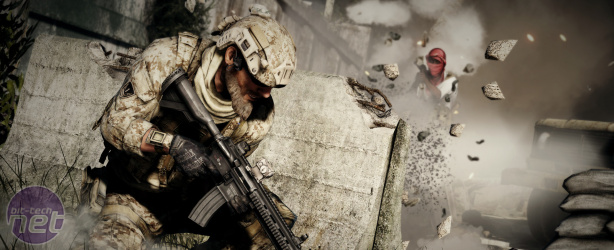
Battle Chatter and Whizz-bys
Ever since I first played The Secret of Monkey Island and first laid ears on Michael Land's iMuse mixing system, I've been fascinated by the way sound is integrated into games. It's always seemed like this weirdly under-appreciated and strangely esoteric aspect of game-making; the sort of thing that works best when you don't notice it at all.What I've found especially interesting lately though isn't just that sound design itself is a super complicated process, but that what we often consider to be the most straightforward and common games are often the most challenging. Take an FPS like Medal of Honor: Warfighter, for example; it's a gritty manshooter not unlike many others, so your assumption might be that it relies on commercial sound libraries for it's audio. One gunshot sounds just like any other, right?
That isn't actually the case. Doing some research into the game recently I uncovered that the Medal of Honor audio directors made the decision to avoid using commercial libraries as much as possible. Instead, they took their own recordings both of real guns used by the military and bizarrely also of common appliances...
"I’m amused by the number of washing machine recordings in the game," EA's Audio Lead Tyler Parsons said in an interview with Sound & Picture. "We destroyed an old washing machine in creative ways [and] I ended up using impacts, ronks, and scrapes from that session as sweeteners in vehicle collisions, RPG impacts on helicopters, anti-aircraft gun explosions, and more."
It wasn't just washing machines either. Tyler and his team go on to reveal all sorts of audio repurposing, including using catapults and loose change to replicate the sound of bullets whizzing by the player. It's startlingly creative work and becomes especially impressive when you couple that with the unique recordings the team took of real-life weapons, tanks and explosions.
Yet, for all that hard work in a game that's basically considered typical for the industry we don't appreciate the importance of sound design a lot of the time. It's usually only when an especially odd title (such as Thief, with it's industrial-techno soundtrack) comes along that anyone thinks to comment on the sound design specifically. That's a shame.
Washing machines: a suitable replacement for all sorts of military devices
It's a shame because, as probably everyone reading this knows, when the sound design in a game fails even slightly then it can have a massive impact. We've all played games where the shotgun doesn't sound powerful enough or where the NPCs repeated the same stock phrases over and over and we know how damaging that can be. It's like a cathedral without an echo; less than it should be.
What's worse though is that in comparable mediums such as film, this isn't the case. Designing audio for a game is much more complicated than in cinema due to the extra layer of interactivity and yet it's cinema which gets all the attention.
What I'm basically saying is: Won't somebody think of the sound designers?
Or, better yet, let's celebrate them a bit and talk about games which have used sound effects and music to really good effect. Personally I've always been impressed by games such as System Shock 2, but more recent stand out titles would probably include Dear Esther, Frozen Synapse and, yes, Medal of Honor.
Let me know your favourites in the comments.

MSI MPG Velox 100R Chassis Review
October 14 2021 | 15:04










Want to comment? Please log in.